BMP4002 Business Law: Examination of English Legal System & Contracts
VerifiedAdded on 2023/06/09
|5
|2195
|251
Report
AI Summary
This report provides a detailed analysis of the English legal system and contract law in the United Kingdom. It begins by defining law according to English legislation and differentiating between criminal and commercial law, highlighting their respective focuses and legal procedures. The report also outlines the four distinct legal systems within the UK: English and Welsh law, Scots law, Northern Ireland law, and Welsh law, explaining their historical context and unique characteristics. Furthermore, it examines the hierarchy of the English legal system, including the Queen’s Bench, Chancery Division, and Family Division, as well as the roles of the Court of Appeal and the Supreme Court. The two main sources of English law, legislation and case law, are discussed, along with the impact of European Union law and the European Convention of Human Rights. The report also delves into the essentials of English contract law, including the formation of a contract, its contents (expressed and implied terms), and the various ways a contract can be terminated, such as expiration, termination, vitiation, and frustration.
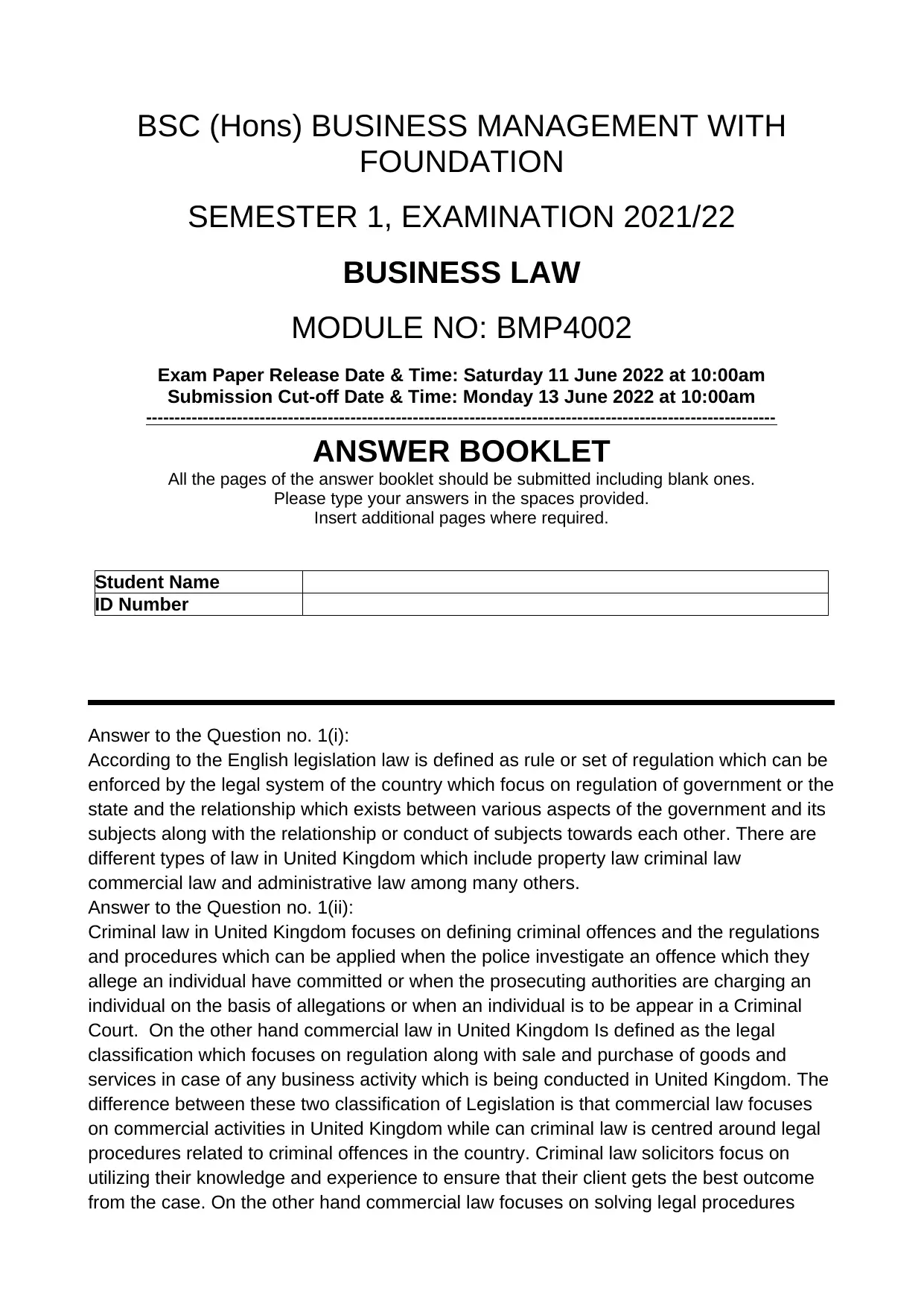
BSC (Hons) BUSINESS MANAGEMENT WITH
FOUNDATION
SEMESTER 1, EXAMINATION 2021/22
BUSINESS LAW
MODULE NO: BMP4002
Exam Paper Release Date & Time: Saturday 11 June 2022 at 10:00am
Submission Cut-off Date & Time: Monday 13 June 2022 at 10:00am
---------------------------------------------------------------------------------------------------------------
ANSWER BOOKLET
All the pages of the answer booklet should be submitted including blank ones.
Please type your answers in the spaces provided.
Insert additional pages where required.
Student Name
ID Number
Answer to the Question no. 1(i):
According to the English legislation law is defined as rule or set of regulation which can be
enforced by the legal system of the country which focus on regulation of government or the
state and the relationship which exists between various aspects of the government and its
subjects along with the relationship or conduct of subjects towards each other. There are
different types of law in United Kingdom which include property law criminal law
commercial law and administrative law among many others.
Answer to the Question no. 1(ii):
Criminal law in United Kingdom focuses on defining criminal offences and the regulations
and procedures which can be applied when the police investigate an offence which they
allege an individual have committed or when the prosecuting authorities are charging an
individual on the basis of allegations or when an individual is to be appear in a Criminal
Court. On the other hand commercial law in United Kingdom Is defined as the legal
classification which focuses on regulation along with sale and purchase of goods and
services in case of any business activity which is being conducted in United Kingdom. The
difference between these two classification of Legislation is that commercial law focuses
on commercial activities in United Kingdom while can criminal law is centred around legal
procedures related to criminal offences in the country. Criminal law solicitors focus on
utilizing their knowledge and experience to ensure that their client gets the best outcome
from the case. On the other hand commercial law focuses on solving legal procedures
FOUNDATION
SEMESTER 1, EXAMINATION 2021/22
BUSINESS LAW
MODULE NO: BMP4002
Exam Paper Release Date & Time: Saturday 11 June 2022 at 10:00am
Submission Cut-off Date & Time: Monday 13 June 2022 at 10:00am
---------------------------------------------------------------------------------------------------------------
ANSWER BOOKLET
All the pages of the answer booklet should be submitted including blank ones.
Please type your answers in the spaces provided.
Insert additional pages where required.
Student Name
ID Number
Answer to the Question no. 1(i):
According to the English legislation law is defined as rule or set of regulation which can be
enforced by the legal system of the country which focus on regulation of government or the
state and the relationship which exists between various aspects of the government and its
subjects along with the relationship or conduct of subjects towards each other. There are
different types of law in United Kingdom which include property law criminal law
commercial law and administrative law among many others.
Answer to the Question no. 1(ii):
Criminal law in United Kingdom focuses on defining criminal offences and the regulations
and procedures which can be applied when the police investigate an offence which they
allege an individual have committed or when the prosecuting authorities are charging an
individual on the basis of allegations or when an individual is to be appear in a Criminal
Court. On the other hand commercial law in United Kingdom Is defined as the legal
classification which focuses on regulation along with sale and purchase of goods and
services in case of any business activity which is being conducted in United Kingdom. The
difference between these two classification of Legislation is that commercial law focuses
on commercial activities in United Kingdom while can criminal law is centred around legal
procedures related to criminal offences in the country. Criminal law solicitors focus on
utilizing their knowledge and experience to ensure that their client gets the best outcome
from the case. On the other hand commercial law focuses on solving legal procedures
Paraphrase This Document
Need a fresh take? Get an instant paraphrase of this document with our AI Paraphraser
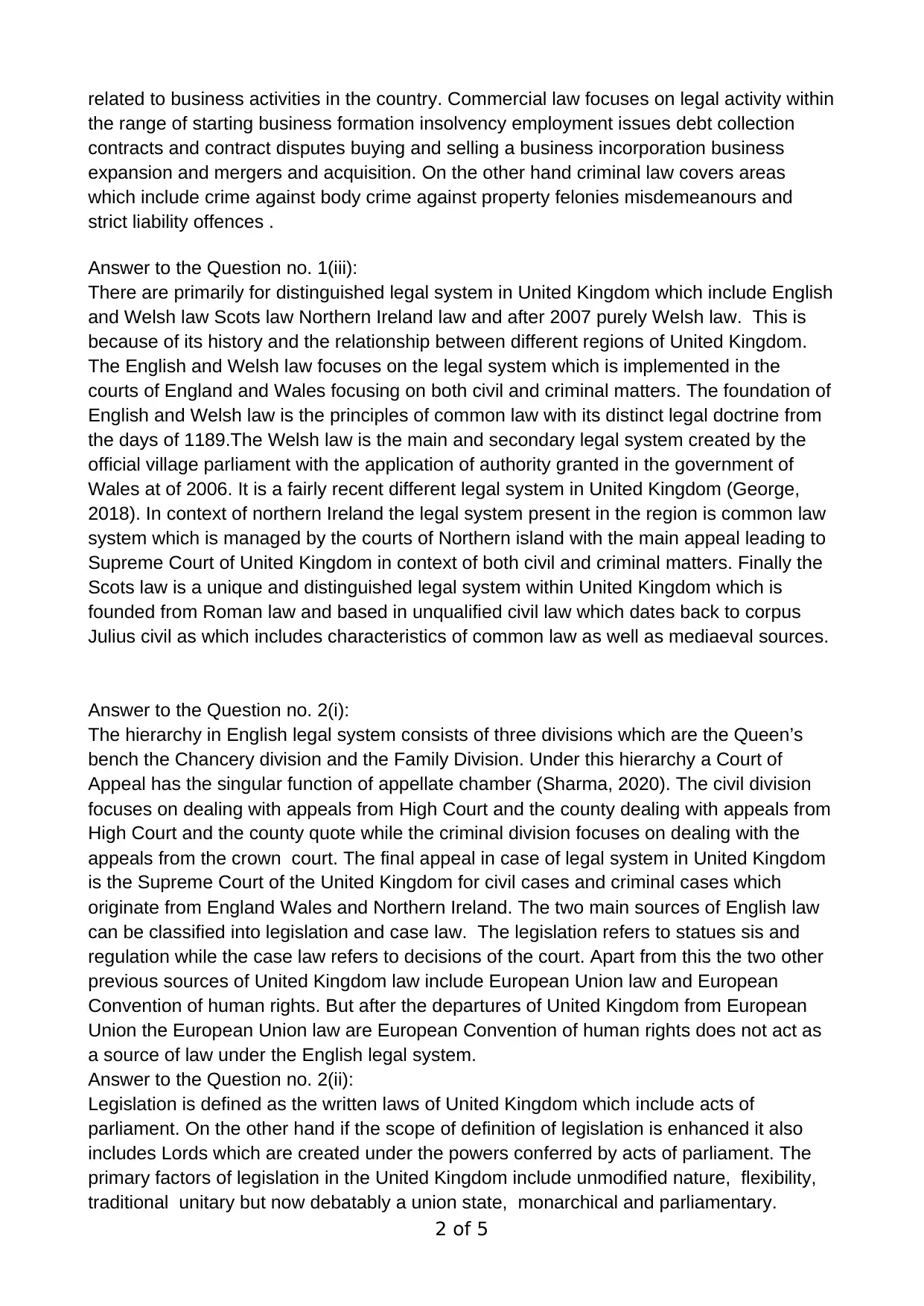
related to business activities in the country. Commercial law focuses on legal activity within
the range of starting business formation insolvency employment issues debt collection
contracts and contract disputes buying and selling a business incorporation business
expansion and mergers and acquisition. On the other hand criminal law covers areas
which include crime against body crime against property felonies misdemeanours and
strict liability offences .
Answer to the Question no. 1(iii):
There are primarily for distinguished legal system in United Kingdom which include English
and Welsh law Scots law Northern Ireland law and after 2007 purely Welsh law. This is
because of its history and the relationship between different regions of United Kingdom.
The English and Welsh law focuses on the legal system which is implemented in the
courts of England and Wales focusing on both civil and criminal matters. The foundation of
English and Welsh law is the principles of common law with its distinct legal doctrine from
the days of 1189.The Welsh law is the main and secondary legal system created by the
official village parliament with the application of authority granted in the government of
Wales at of 2006. It is a fairly recent different legal system in United Kingdom (George,
2018). In context of northern Ireland the legal system present in the region is common law
system which is managed by the courts of Northern island with the main appeal leading to
Supreme Court of United Kingdom in context of both civil and criminal matters. Finally the
Scots law is a unique and distinguished legal system within United Kingdom which is
founded from Roman law and based in unqualified civil law which dates back to corpus
Julius civil as which includes characteristics of common law as well as mediaeval sources.
Answer to the Question no. 2(i):
The hierarchy in English legal system consists of three divisions which are the Queen’s
bench the Chancery division and the Family Division. Under this hierarchy a Court of
Appeal has the singular function of appellate chamber (Sharma, 2020). The civil division
focuses on dealing with appeals from High Court and the county dealing with appeals from
High Court and the county quote while the criminal division focuses on dealing with the
appeals from the crown court. The final appeal in case of legal system in United Kingdom
is the Supreme Court of the United Kingdom for civil cases and criminal cases which
originate from England Wales and Northern Ireland. The two main sources of English law
can be classified into legislation and case law. The legislation refers to statues sis and
regulation while the case law refers to decisions of the court. Apart from this the two other
previous sources of United Kingdom law include European Union law and European
Convention of human rights. But after the departures of United Kingdom from European
Union the European Union law are European Convention of human rights does not act as
a source of law under the English legal system.
Answer to the Question no. 2(ii):
Legislation is defined as the written laws of United Kingdom which include acts of
parliament. On the other hand if the scope of definition of legislation is enhanced it also
includes Lords which are created under the powers conferred by acts of parliament. The
primary factors of legislation in the United Kingdom include unmodified nature, flexibility,
traditional unitary but now debatably a union state, monarchical and parliamentary.
2 of 5
the range of starting business formation insolvency employment issues debt collection
contracts and contract disputes buying and selling a business incorporation business
expansion and mergers and acquisition. On the other hand criminal law covers areas
which include crime against body crime against property felonies misdemeanours and
strict liability offences .
Answer to the Question no. 1(iii):
There are primarily for distinguished legal system in United Kingdom which include English
and Welsh law Scots law Northern Ireland law and after 2007 purely Welsh law. This is
because of its history and the relationship between different regions of United Kingdom.
The English and Welsh law focuses on the legal system which is implemented in the
courts of England and Wales focusing on both civil and criminal matters. The foundation of
English and Welsh law is the principles of common law with its distinct legal doctrine from
the days of 1189.The Welsh law is the main and secondary legal system created by the
official village parliament with the application of authority granted in the government of
Wales at of 2006. It is a fairly recent different legal system in United Kingdom (George,
2018). In context of northern Ireland the legal system present in the region is common law
system which is managed by the courts of Northern island with the main appeal leading to
Supreme Court of United Kingdom in context of both civil and criminal matters. Finally the
Scots law is a unique and distinguished legal system within United Kingdom which is
founded from Roman law and based in unqualified civil law which dates back to corpus
Julius civil as which includes characteristics of common law as well as mediaeval sources.
Answer to the Question no. 2(i):
The hierarchy in English legal system consists of three divisions which are the Queen’s
bench the Chancery division and the Family Division. Under this hierarchy a Court of
Appeal has the singular function of appellate chamber (Sharma, 2020). The civil division
focuses on dealing with appeals from High Court and the county dealing with appeals from
High Court and the county quote while the criminal division focuses on dealing with the
appeals from the crown court. The final appeal in case of legal system in United Kingdom
is the Supreme Court of the United Kingdom for civil cases and criminal cases which
originate from England Wales and Northern Ireland. The two main sources of English law
can be classified into legislation and case law. The legislation refers to statues sis and
regulation while the case law refers to decisions of the court. Apart from this the two other
previous sources of United Kingdom law include European Union law and European
Convention of human rights. But after the departures of United Kingdom from European
Union the European Union law are European Convention of human rights does not act as
a source of law under the English legal system.
Answer to the Question no. 2(ii):
Legislation is defined as the written laws of United Kingdom which include acts of
parliament. On the other hand if the scope of definition of legislation is enhanced it also
includes Lords which are created under the powers conferred by acts of parliament. The
primary factors of legislation in the United Kingdom include unmodified nature, flexibility,
traditional unitary but now debatably a union state, monarchical and parliamentary.
2 of 5
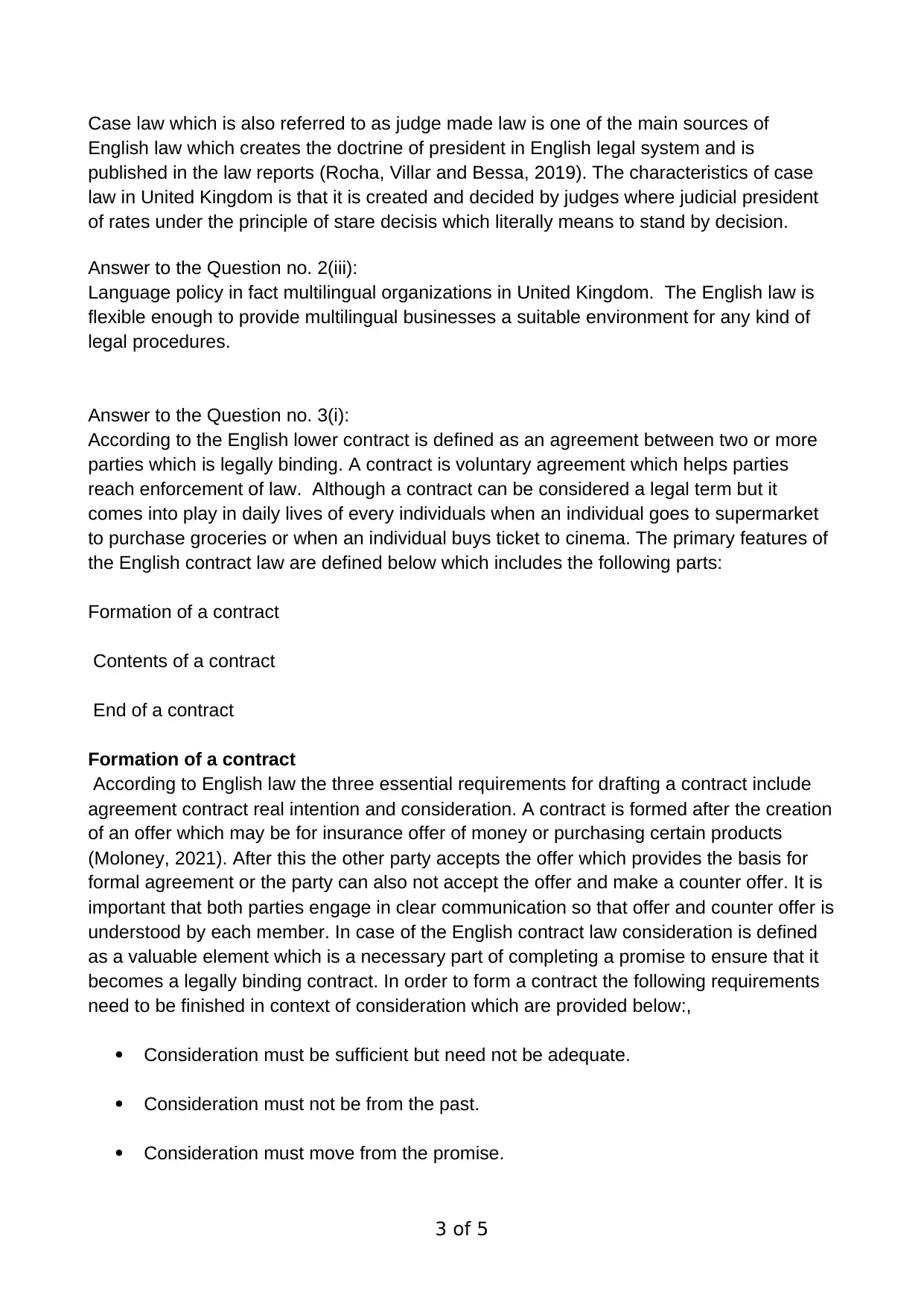
Case law which is also referred to as judge made law is one of the main sources of
English law which creates the doctrine of president in English legal system and is
published in the law reports (Rocha, Villar and Bessa, 2019). The characteristics of case
law in United Kingdom is that it is created and decided by judges where judicial president
of rates under the principle of stare decisis which literally means to stand by decision.
Answer to the Question no. 2(iii):
Language policy in fact multilingual organizations in United Kingdom. The English law is
flexible enough to provide multilingual businesses a suitable environment for any kind of
legal procedures.
Answer to the Question no. 3(i):
According to the English lower contract is defined as an agreement between two or more
parties which is legally binding. A contract is voluntary agreement which helps parties
reach enforcement of law. Although a contract can be considered a legal term but it
comes into play in daily lives of every individuals when an individual goes to supermarket
to purchase groceries or when an individual buys ticket to cinema. The primary features of
the English contract law are defined below which includes the following parts:
Formation of a contract
Contents of a contract
End of a contract
Formation of a contract
According to English law the three essential requirements for drafting a contract include
agreement contract real intention and consideration. A contract is formed after the creation
of an offer which may be for insurance offer of money or purchasing certain products
(Moloney, 2021). After this the other party accepts the offer which provides the basis for
formal agreement or the party can also not accept the offer and make a counter offer. It is
important that both parties engage in clear communication so that offer and counter offer is
understood by each member. In case of the English contract law consideration is defined
as a valuable element which is a necessary part of completing a promise to ensure that it
becomes a legally binding contract. In order to form a contract the following requirements
need to be finished in context of consideration which are provided below:,
Consideration must be sufficient but need not be adequate.
Consideration must not be from the past.
Consideration must move from the promise.
3 of 5
English law which creates the doctrine of president in English legal system and is
published in the law reports (Rocha, Villar and Bessa, 2019). The characteristics of case
law in United Kingdom is that it is created and decided by judges where judicial president
of rates under the principle of stare decisis which literally means to stand by decision.
Answer to the Question no. 2(iii):
Language policy in fact multilingual organizations in United Kingdom. The English law is
flexible enough to provide multilingual businesses a suitable environment for any kind of
legal procedures.
Answer to the Question no. 3(i):
According to the English lower contract is defined as an agreement between two or more
parties which is legally binding. A contract is voluntary agreement which helps parties
reach enforcement of law. Although a contract can be considered a legal term but it
comes into play in daily lives of every individuals when an individual goes to supermarket
to purchase groceries or when an individual buys ticket to cinema. The primary features of
the English contract law are defined below which includes the following parts:
Formation of a contract
Contents of a contract
End of a contract
Formation of a contract
According to English law the three essential requirements for drafting a contract include
agreement contract real intention and consideration. A contract is formed after the creation
of an offer which may be for insurance offer of money or purchasing certain products
(Moloney, 2021). After this the other party accepts the offer which provides the basis for
formal agreement or the party can also not accept the offer and make a counter offer. It is
important that both parties engage in clear communication so that offer and counter offer is
understood by each member. In case of the English contract law consideration is defined
as a valuable element which is a necessary part of completing a promise to ensure that it
becomes a legally binding contract. In order to form a contract the following requirements
need to be finished in context of consideration which are provided below:,
Consideration must be sufficient but need not be adequate.
Consideration must not be from the past.
Consideration must move from the promise.
3 of 5
⊘ This is a preview!⊘
Do you want full access?
Subscribe today to unlock all pages.

Trusted by 1+ million students worldwide
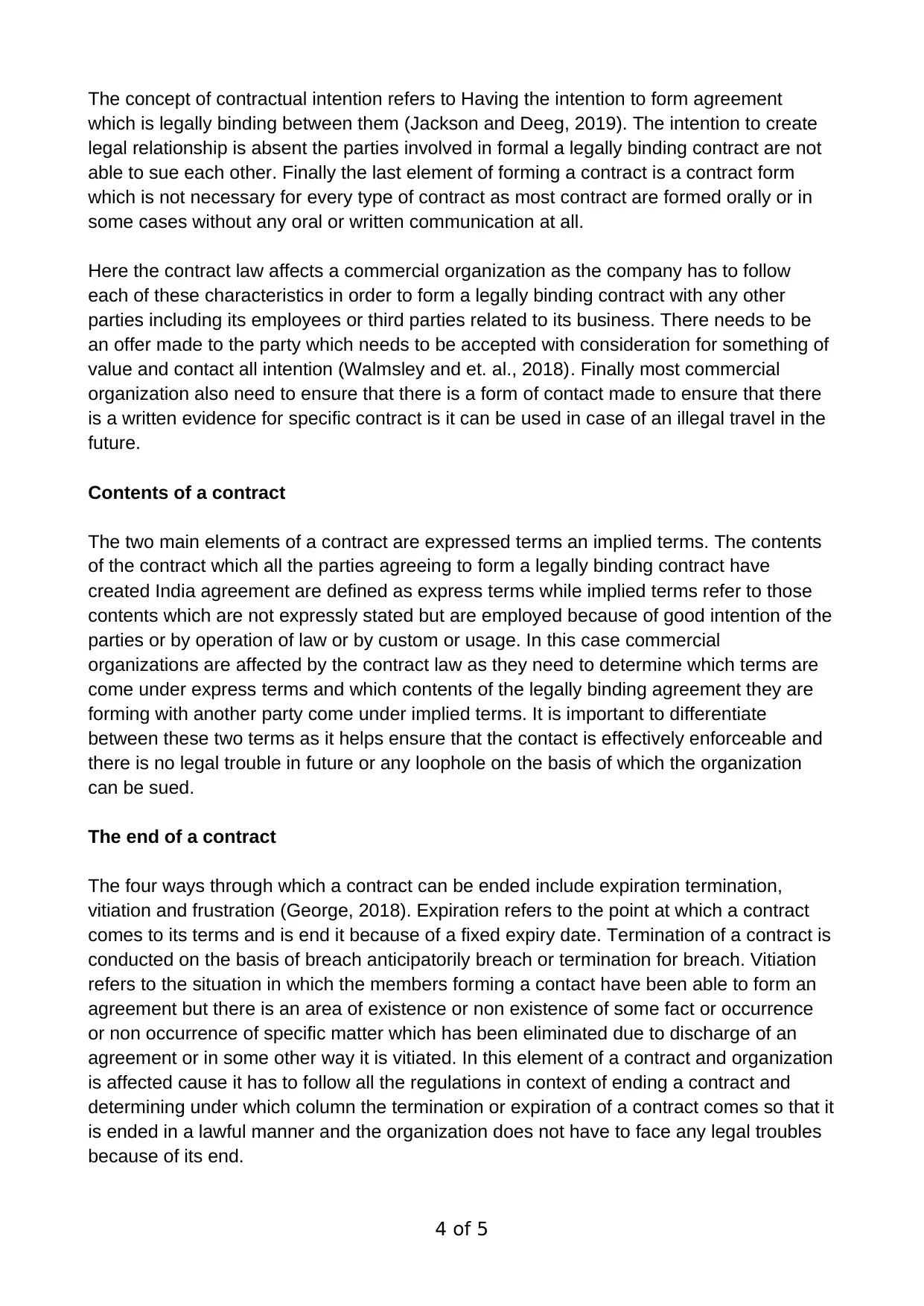
The concept of contractual intention refers to Having the intention to form agreement
which is legally binding between them (Jackson and Deeg, 2019). The intention to create
legal relationship is absent the parties involved in formal a legally binding contract are not
able to sue each other. Finally the last element of forming a contract is a contract form
which is not necessary for every type of contract as most contract are formed orally or in
some cases without any oral or written communication at all.
Here the contract law affects a commercial organization as the company has to follow
each of these characteristics in order to form a legally binding contract with any other
parties including its employees or third parties related to its business. There needs to be
an offer made to the party which needs to be accepted with consideration for something of
value and contact all intention (Walmsley and et. al., 2018). Finally most commercial
organization also need to ensure that there is a form of contact made to ensure that there
is a written evidence for specific contract is it can be used in case of an illegal travel in the
future.
Contents of a contract
The two main elements of a contract are expressed terms an implied terms. The contents
of the contract which all the parties agreeing to form a legally binding contract have
created India agreement are defined as express terms while implied terms refer to those
contents which are not expressly stated but are employed because of good intention of the
parties or by operation of law or by custom or usage. In this case commercial
organizations are affected by the contract law as they need to determine which terms are
come under express terms and which contents of the legally binding agreement they are
forming with another party come under implied terms. It is important to differentiate
between these two terms as it helps ensure that the contact is effectively enforceable and
there is no legal trouble in future or any loophole on the basis of which the organization
can be sued.
The end of a contract
The four ways through which a contract can be ended include expiration termination,
vitiation and frustration (George, 2018). Expiration refers to the point at which a contract
comes to its terms and is end it because of a fixed expiry date. Termination of a contract is
conducted on the basis of breach anticipatorily breach or termination for breach. Vitiation
refers to the situation in which the members forming a contact have been able to form an
agreement but there is an area of existence or non existence of some fact or occurrence
or non occurrence of specific matter which has been eliminated due to discharge of an
agreement or in some other way it is vitiated. In this element of a contract and organization
is affected cause it has to follow all the regulations in context of ending a contract and
determining under which column the termination or expiration of a contract comes so that it
is ended in a lawful manner and the organization does not have to face any legal troubles
because of its end.
4 of 5
which is legally binding between them (Jackson and Deeg, 2019). The intention to create
legal relationship is absent the parties involved in formal a legally binding contract are not
able to sue each other. Finally the last element of forming a contract is a contract form
which is not necessary for every type of contract as most contract are formed orally or in
some cases without any oral or written communication at all.
Here the contract law affects a commercial organization as the company has to follow
each of these characteristics in order to form a legally binding contract with any other
parties including its employees or third parties related to its business. There needs to be
an offer made to the party which needs to be accepted with consideration for something of
value and contact all intention (Walmsley and et. al., 2018). Finally most commercial
organization also need to ensure that there is a form of contact made to ensure that there
is a written evidence for specific contract is it can be used in case of an illegal travel in the
future.
Contents of a contract
The two main elements of a contract are expressed terms an implied terms. The contents
of the contract which all the parties agreeing to form a legally binding contract have
created India agreement are defined as express terms while implied terms refer to those
contents which are not expressly stated but are employed because of good intention of the
parties or by operation of law or by custom or usage. In this case commercial
organizations are affected by the contract law as they need to determine which terms are
come under express terms and which contents of the legally binding agreement they are
forming with another party come under implied terms. It is important to differentiate
between these two terms as it helps ensure that the contact is effectively enforceable and
there is no legal trouble in future or any loophole on the basis of which the organization
can be sued.
The end of a contract
The four ways through which a contract can be ended include expiration termination,
vitiation and frustration (George, 2018). Expiration refers to the point at which a contract
comes to its terms and is end it because of a fixed expiry date. Termination of a contract is
conducted on the basis of breach anticipatorily breach or termination for breach. Vitiation
refers to the situation in which the members forming a contact have been able to form an
agreement but there is an area of existence or non existence of some fact or occurrence
or non occurrence of specific matter which has been eliminated due to discharge of an
agreement or in some other way it is vitiated. In this element of a contract and organization
is affected cause it has to follow all the regulations in context of ending a contract and
determining under which column the termination or expiration of a contract comes so that it
is ended in a lawful manner and the organization does not have to face any legal troubles
because of its end.
4 of 5
Paraphrase This Document
Need a fresh take? Get an instant paraphrase of this document with our AI Paraphraser
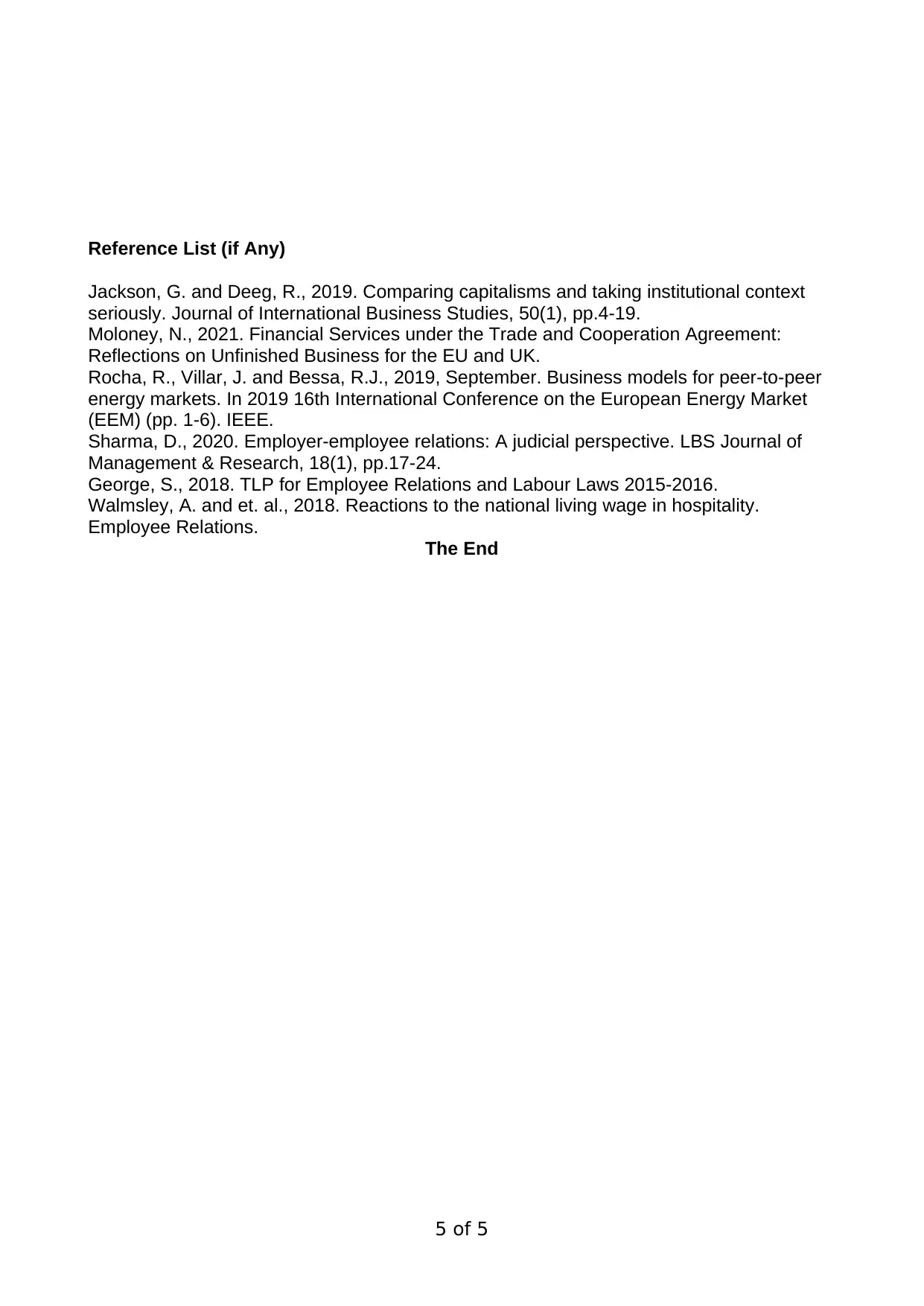
Reference List (if Any)
Jackson, G. and Deeg, R., 2019. Comparing capitalisms and taking institutional context
seriously. Journal of International Business Studies, 50(1), pp.4-19.
Moloney, N., 2021. Financial Services under the Trade and Cooperation Agreement:
Reflections on Unfinished Business for the EU and UK.
Rocha, R., Villar, J. and Bessa, R.J., 2019, September. Business models for peer-to-peer
energy markets. In 2019 16th International Conference on the European Energy Market
(EEM) (pp. 1-6). IEEE.
Sharma, D., 2020. Employer-employee relations: A judicial perspective. LBS Journal of
Management & Research, 18(1), pp.17-24.
George, S., 2018. TLP for Employee Relations and Labour Laws 2015-2016.
Walmsley, A. and et. al., 2018. Reactions to the national living wage in hospitality.
Employee Relations.
The End
5 of 5
Jackson, G. and Deeg, R., 2019. Comparing capitalisms and taking institutional context
seriously. Journal of International Business Studies, 50(1), pp.4-19.
Moloney, N., 2021. Financial Services under the Trade and Cooperation Agreement:
Reflections on Unfinished Business for the EU and UK.
Rocha, R., Villar, J. and Bessa, R.J., 2019, September. Business models for peer-to-peer
energy markets. In 2019 16th International Conference on the European Energy Market
(EEM) (pp. 1-6). IEEE.
Sharma, D., 2020. Employer-employee relations: A judicial perspective. LBS Journal of
Management & Research, 18(1), pp.17-24.
George, S., 2018. TLP for Employee Relations and Labour Laws 2015-2016.
Walmsley, A. and et. al., 2018. Reactions to the national living wage in hospitality.
Employee Relations.
The End
5 of 5
1 out of 5
Related Documents
Your All-in-One AI-Powered Toolkit for Academic Success.
+13062052269
info@desklib.com
Available 24*7 on WhatsApp / Email
![[object Object]](/_next/static/media/star-bottom.7253800d.svg)
Unlock your academic potential
Copyright © 2020–2026 A2Z Services. All Rights Reserved. Developed and managed by ZUCOL.



